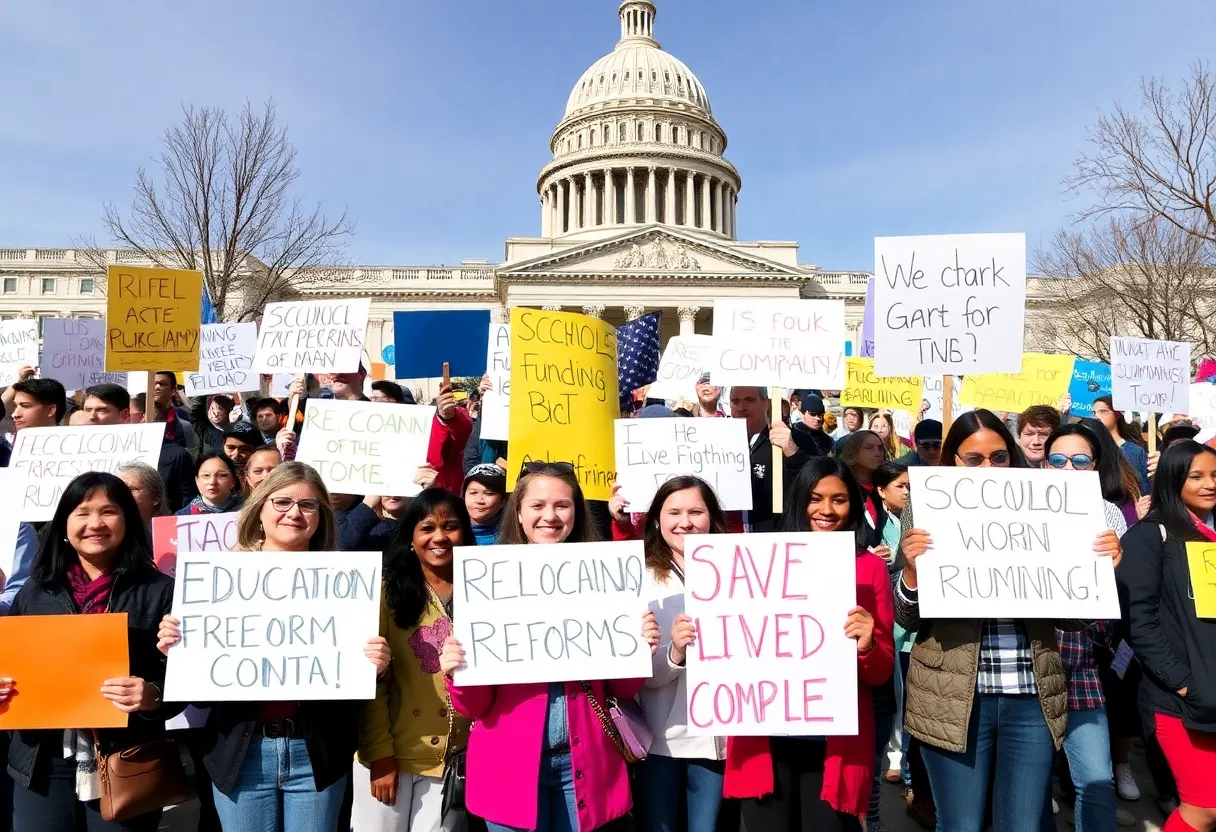News Summary
The Philadelphia School District and the Philadelphia Federation of Teachers rallied at the state Capitol, urging lawmakers to support a significant increase in school funding and reform of cyber charter schools. This unprecedented alliance highlights the need for adequate financial support amidst ongoing budget challenges. Participants, including district officials and local lawmakers, emphasized the importance of Governor Shapiro’s proposed education funding increase of $202 million and called for tighter oversight of cyber charter schools. The main message focused on achieving equitable funding for all students across Pennsylvania.
Harrisburg – In a historic demonstration, the Philadelphia School District and the Philadelphia Federation of Teachers (PFT) rallied at the state Capitol, advocating for significant increases in school funding and reforms for cyber charter schools. This unprecedented alliance, described by PFT President Arthur G. Steinberg as a potential indicator of future collaboration, saw participation from various stakeholders, including district superintendent Tony B. Watlington Sr. and president of the Philadelphia Board of Education, Reginald Streater, along with teachers, students, and Democratic lawmakers from the area.
The focus of the rally centered on urging the Pennsylvania legislature to support Governor Josh Shapiro’s proposed education funding increase, which includes a $202 million boost to the district’s budget compared to last year. Additionally, attendees called for the passage of a bill aimed at increasing oversight and reform of cyber charter schools, which currently receive considerable funding and have been criticized for financial practices.
Recently, PFT members authorized a strike vote, marking the first such action in decades. However, this measure was expressed as a precautionary step rather than a prelude to immediate strike action. Negotiations concerning a new contract between the PFT and the district have been ongoing, characterized as slow but civil, without current indications of impending strike action.
Steinberg underscored the importance of Shapiro’s funding proposal, which includes $526 million allocated to assist poorer school districts. He argued that this amount should only serve as a starting point for funding necessities. The School District of Philadelphia’s recent approval of a $4.7 billion budget for the 2024-25 school year, which utilizes $300 million from reserves to avoid layoffs and cuts, reflects the financial pressures the district faces as it is the only one in Pennsylvania unable to levy its own taxes, projecting a structural deficit of $774 million by 2030.
The budget currently does not accommodate future costs associated with negotiating new contracts with multiple unions, including the PFT, with all existing agreements set to expire on August 31. Steinberg has also expressed concern regarding garnering support from the Republican majority in the state Senate for these proposed funding increases, which have long been a concern for Philadelphia’s schools.
Historically, Philadelphia schools have faced chronic underfunding, which has adversely affected staffing, salaries, and overall educational quality. Recent court rulings have determined that Pennsylvania’s school funding system is unconstitutional, as it disproportionately disadvantages poorer districts. The existing funding model for cyber charter schools necessitates that the district pays $12,709.40 per student, with an even higher cost for special education students.
Representative Mary Isaacson (D-Philadelphia) is sponsoring a bill that seeks to reform the funding and oversight of cyber charter schools, proposing a standardized tuition rate of $8,000 for non-special education students. This bill has successfully passed through the Democratic-controlled Pennsylvania House and is awaiting consideration in the Republican-controlled Senate.
Concerns regarding the funding formula for cyber charter schools have heightened, following a report from Pennsylvania’s auditor general indicating that these institutions significantly increased their revenues from 2020 to 2023. This report has sparked criticism surrounding how funding is allocated and spent within these schools.
The main message conveyed at the rally emphasized the essential need for appropriate and equitable funding to enhance academic achievement for all students across Pennsylvania, reinforcing the call for changes in how education is financed throughout the state.
Deeper Dive: News & Info About This Topic
HERE Resources
School District of Philadelphia Faces Criminal Charges for Asbestos Violations
Amazon’s $20 Billion Investment Boosts Pennsylvania Economy
Pennsylvania Lawmakers Approach Budget Deadline Amid Controversies
Financial Challenges Propel Closure of Major Colleges in Pennsylvania
University of Pennsylvania Ranked Top in Pennsylvania Schools
Federal Funding Cuts Reshape Higher Education Landscape
University of Pennsylvania Hits Record Low Admission Rate
Declining Measles Vaccination Rates in Pennsylvania Raise Concerns
Dr. Tony Watlington Named National Superintendent of the Year
UPenn’s Former President Criticizes Testimony on Antisemitism
Additional Resources
- CBS News: School Funding in Pennsylvania
- NBC Philadelphia: Philly Teachers Head to Harrisburg
- Inquirer: Philadelphia Federation of Teachers on Budget
- Patch: Philadelphia Teachers Push for More Funding
- CBS News: Teachers Board Bus to Harrisburg
- Wikipedia: School Funding in the United States
- Encyclopedia Britannica: Education Funding
- Google Search: Pennsylvania School Funding
- Google Scholar: School Funding Reform Pennsylvania
- Google News: Philadelphia Teachers Funding
Author: STAFF HERE PHILADELPHIA WRITER
The PHILADELPHIA STAFF WRITER represents the experienced team at HEREPhiladelphia.com, your go-to source for actionable local news and information in Philadelphia, Philadelphia County, and beyond. Specializing in "news you can use," we cover essential topics like product reviews for personal and business needs, local business directories, politics, real estate trends, neighborhood insights, and state news affecting the area—with deep expertise drawn from years of dedicated reporting and strong community input, including local press releases and business updates. We deliver top reporting on high-value events such as Mummers Parade, Philadelphia Flower Show, and Thanksgiving Day Parade. Our coverage extends to key organizations like the Greater Philadelphia Chamber of Commerce and United Way of Greater Philadelphia, plus leading businesses in telecommunications, food services, and healthcare that power the local economy such as Comcast, Aramark, and Children's Hospital of Philadelphia. As part of the broader HERE network, we provide comprehensive, credible insights into Pennsylvania's dynamic landscape.





